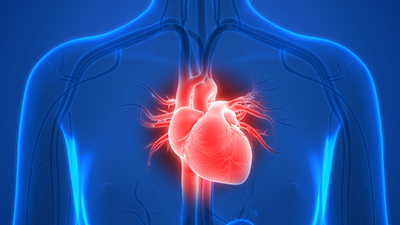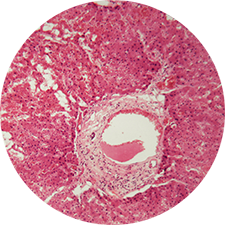The Cardiac Amyloidosis and Cardiomyopathy Center
at Robert Wood Johnson University Hospital and Rutgers Robert Wood Johnson Medical School
1-866-NJAMYLOID / 1-866-652-6956
 Robert Wood Johnson University Hospital (RWJUH) and Rutgers Robert Wood
Johnson Medical School (Rutgers RWJMS) have established the Cardiac Amyloidosis
and Cardiomyopathy Center to diagnose patients with rare, but potentially
fatal, amyloid conditions earlier and treat them more effectively through
personalized medicine.
Robert Wood Johnson University Hospital (RWJUH) and Rutgers Robert Wood
Johnson Medical School (Rutgers RWJMS) have established the Cardiac Amyloidosis
and Cardiomyopathy Center to diagnose patients with rare, but potentially
fatal, amyloid conditions earlier and treat them more effectively through
personalized medicine.
Patients in the Cardiac Amyloidosis and Cardiomyopathy Center at RWJUH and Rutgers RWJMS benefit from a multidisciplinary team approach that includes specialists across a broad range of disciplines such as cardiology, neurology, hematology, nephrology, pathology and bone marrow transplantation. The clinical teams work together to identify the forms of the disease and develop an effective, individualized treatment plan.
About Amyloidosis
 Amyloidosis is a rare condition caused by an abnormal protein that accumulates
in organs, like the heart, kidneys, nerves or liver. Often misdiagnosed
or undiagnosed due to its subtle symptoms and multiple organ involvement,
at least one type of amyloidosis can be fatal in six months.
Amyloidosis is a rare condition caused by an abnormal protein that accumulates
in organs, like the heart, kidneys, nerves or liver. Often misdiagnosed
or undiagnosed due to its subtle symptoms and multiple organ involvement,
at least one type of amyloidosis can be fatal in six months.
In the heart, for example, amyloidosis stiffens the walls of the heart, making it much less efficient at pumping blood through the body. Nearly all amyloidosis cases fall into two types: AL amyloidosis, also called primary amyloidosis, and transthyretin cardiac amyloidosis. There are two types of transthyretin cardiac amyloidosis – hereditary and wild type. If left untreated, AL amyloidosis can be fatal in six months. Hereditary or wild type amyloidosis can be fatal in 2.5 to 3.5 years on average.
Amyloidosis Symptoms
Diagnosing amyloidosis can be challenging because the symptoms can be similar to other conditions, such as carpal tunnel syndrome, heart failure, renal failure or neuropathy. Other signs of potential amyloidosis include an irregular heartbeat, heart blocks, lightheadedness, tingling or numbness of extremities, diarrhea or constipation, shortness of breath, severe fatigue and swelling in the legs and ankles.
Amyloidosis Diagnosis
If your physician suspects amyloidosis, he/she will monitor you closely with several screening tests, including a technetium-99m pyrophosphate scintigraphy (PYP) scan. The PYP scintigraphy scan for diagnosing TTR cardiac amyloidosis is imaging developed by the Center’s Director, Sabahat Bokhari, MD.
A PYP scan uses a radioactive form of pyrophosphate to identify cardiac amyloidosis. The scan can also tell what form of amyloidosis an individual may have.
How is the scan done?
A technologist injects the Tc99m-PYP into an arm vein. About one to three hours later, you will be asked to lie on your back on an exam table. The technologist will help make you comfortable.
The table will move inside a CT camera. You must lie very still, with your arms above your head, while the camera hovers over your chest. If you move, the pictures will be blurry and may have to be repeated. You will be inside the camera for about 30 minutes.
What will I feel during the scan?
There may be some minor discomfort from the IV. Some may feel discomfort while trying to lie still on the exam table.
What happens to the radioactive tracer?
Most of the Tc99m-PYP passes out of the body in urine or stools. The remainder goes away over time.
Who interprets the results and how do I get them?
A physician specializing in nuclear cardiology will review your images, prepare a report, and share it with your provider. Your provider will discuss the results of your scan with you. Your care team will then meet with you to develop a personalized plan of care if needed.
Amyloidosis Treatment
Your medical team can manage the condition with therapeutic prescription drugs. If detected early, patients can expect a normal quality of life and normal life span.
Patient Resources
Your Heart’s Message is an educational website for patients on ATTR-CM with information about signs/symptoms and recommendations for treatment.
The Amyloidosis Foundation supports patients and families while promoting research, education and awareness about the disease.
The Amyloidosis Research Consortium provides patients with information about new and innovative treatment advances for this disease.
Rare Connect is an online platform that connects individuals and families living with this rare disease from all over the world. The website is available in 12 languages.
Physician and Provider Resources
Suspect and Detect is a website for physicians and health care providers dedicated to educating them about the difference between the various types and the clinical presentation of amyloid cardiomyopathy (ATTR-CM).
Contact the Cardiac Amyloidosis and Cardiomyopathy Center at 1-866-NJAMYLOID / 1-866-652-6956.



